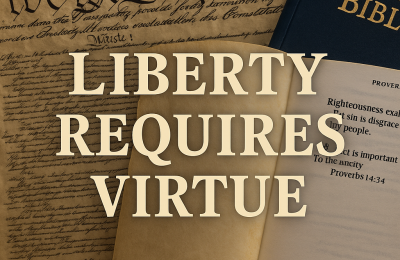Part 2 of an unexpected series
Oh, what a difference a few hours makes…
Just yesterday, I published an article on the Texas A&M gender ideology controversy. In it, I argued that the heart of the matter was not politics, but integrity, keeping course content faithful to the published syllabus and honoring students with clarity, not indoctrination.
Since then, events have moved at lightning speed. The Daily Wire released video of a student being removed from class after objecting to gender ideology content. The U.S. Department of Justice announced a Civil Rights investigation. Texas A&M Chancellor Glenn Hegar condemned faculty for using classrooms to push personal agendas. And President Mark Welsh removed both the Dean of Arts & Sciences and the Head of the English Department from their administrative positions, citing their failure to uphold curricular integrity.
What looked yesterday like a brewing storm has now become a national flashpoint.
As a Colson Fellow, I am trained to look at cultural moments like this through a biblical worldview. The Colson Fellows Program is a 10-month intensive that equips believers to understand worldviews, recognize cultural currents, and engage “flashpoints” like sexuality, LGBTQ ideology, and religious liberty with biblical discernment. Rather than retreat from culture or baptize it, Colson Fellows are called to engage it with both clarity and compassion .
In A Practical Guide to Culture, John Stonestreet and Brett Kunkle summarize this posture with four simple—but profound—questions (p. 272):
- What good can we celebrate, protect, promote, and preserve?
- What is missing that we can contribute?
- What is evil that must stop?
- What is broken that we can help restore?
These four questions form a biblical grid for cultural engagement. They move us beyond reaction into discernment. They force us to see culture as part of the larger story of Creation, Fall, Redemption, and Restoration. And they remind us that Christians are not merely critics but stewards, called to live out the truth of Christ in every sphere.
So let’s apply these questions to the unfolding situation at Texas A&M.
1. What Good Can We Celebrate, Protect, Promote, and Preserve?
First, let’s pause to celebrate what is good. Texas A&M leadership acted quickly and decisively. Chancellor Hegar reminded faculty that classrooms are not platforms for political or ideological indoctrination. President Welsh acknowledged the breach of trust: when course descriptions and syllabi do not match what is taught, students are misled. To correct this, Welsh removed senior leaders who permitted the misalignment. That is accountability. That is integrity. And that is good.
We can also affirm President Welsh’s larger point: courses on LGBTQ ideology can have a place in the university. There is academic value in studying cultural ideologies; whether Marxism, critical race theory, or queer theory—not to promote them, but to understand them. Christians, especially, cannot engage a worldview we do not understand. That is why the Colson Fellows curriculum includes books like Carl Trueman’s Strange New World and Christopher Yuan’s Holy Sexuality and the Gospel. We study not to be swayed but to discern.
And we must preserve what is best about Aggieland itself: the Core Value of Integrity. Students deserve to know what they are signing up for. When the catalog says “Children’s Literature,” they should not be blindsided by ideological content better suited for a gender studies elective. Preserving academic transparency is not just an administrative duty; it is a moral one.
“Therefore, laying aside falsehood, speak truth each one of you with his neighbor” (Ephesians 4:25, LSB).
2. What Is Missing That We Can Contribute?
Here is where Christians can add value.
What was missing in this entire episode was discernment. Between the summer course and this week’s headlines, we do not know what conversations took place internally. But the escalation to national media, partisan attacks, and federal investigation makes it clear that meaningful dialogue was lacking.
State Rep. Brian Harrison raised valid concerns, but the way those concerns were packaged, through press releases and culture-war rhetoric, suggests more heat than light. Instead of starting with internal accountability, it leapt straight to confrontation.
What is missing in this picture is the ability to separate education from indoctrination. Courses on ideology can be taught responsibly when clearly identified. What must be resisted is the smuggling of ideology into courses without warning. That’s where the breach of trust occurs.
Christians can contribute here by modeling discernment. The Colson Fellows framework trains us to first understand worldviews, then engage them biblically. We are not called to panic or to mirror the outrage of politics. We are called to equip students and believers to face cultural ideas with clarity and confidence.
This is the contribution the church can make: helping young people see that learning about gender ideology is not the same as endorsing it, and that Scripture gives them the tools to test every idea.
“…that your love may abound still more and more in full knowledge and all discernment” (Philippians 1:9, LSB).
3. What Is Evil That Must Stop?
This controversy has unmasked at least three evils that must be stopped.
- Indoctrination disguised as education. Sneaking ideology into a Children’s Literature course is dishonest. It is a form of deception, and it violates the very trust upon which education depends.
- Silencing dissent. The student removed from class for objecting is not an isolated casualty. It is a reminder that, in many places, dissent is no longer tolerated. This is antithetical to the free exchange of ideas that higher education claims to uphold.
- Politicization for personal gain. Culture-war politics often turn legitimate concerns into weapons. When leaders attack institutions not for reform but for headlines, integrity suffers on both sides.
Christians must be wise here. We cannot join the outrage machine. We cannot let our engagement be co-opted by partisan agendas. We must confront evil with truth, but truth delivered in the character of Christ, full of grace, clarity, and courage.
“See to it that no one takes you captive through philosophy and empty deception” (Colossians 2:8, LSB).
4. What Is Broken That We Can Help Restore?
Trust has been broken. Students are left wondering if they can trust course descriptions again. Dialogue has been broken. Instead of sober institutional reflection, the issue exploded into political sparring and national headlines. Witness has been broken. Christians risk being seen as just another angry constituency instead of thoughtful, compassionate truth-tellers.
How can we help restore?
- Transparency in curriculum. Universities must strengthen syllabus oversight and hold faculty accountable for fidelity to course descriptions.
- Equipped believers. Churches, parents, and Christian ministries must disciple students to recognize and resist ideology. This is precisely why Colson Fellows study flashpoints like sexuality, gender identity, and religious liberty not to adopt them, but to prepare to answer them .
- Gospel witness. Christians must demonstrate a better way. We must model how to understand without endorsing, critique without caricature, and love without compromise.
“And the Lord’s slave must not be quarrelsome, but be kind to all, able to teach, patient when wronged, with gentleness correcting those who are in opposition” (2 Timothy 2:24–25, LSB).
Conclusion: A Call to Integrity and Discernment
Yesterday, I wrote that the Aggie Spirit was being tested. Today, I can say that Aggie leadership has demanded integrity. That is worth celebrating. But the deeper work remains.
We need to teach students that ideology will show up in their classrooms and workplaces. We need to equip them to discern the difference between study and indoctrination. We need to remind the church that our task is not to withdraw or to mimic the outrage of the world, but to engage faithfully, biblically, and courageously.
This is the Colson Fellows way:
- Celebrate the good.
- Contribute what is missing.
- Confront what is evil.
- Restore what is broken.
Aggieland has reminded us that integrity matters. The people of God must remind the world that truth matters, and that truth has a name: Jesus Christ.
Integrity is not merely tested, it must be demanded. And when it is demanded, may we be ready with answers rooted in Scripture, lived out with courage, and seasoned with grace.








